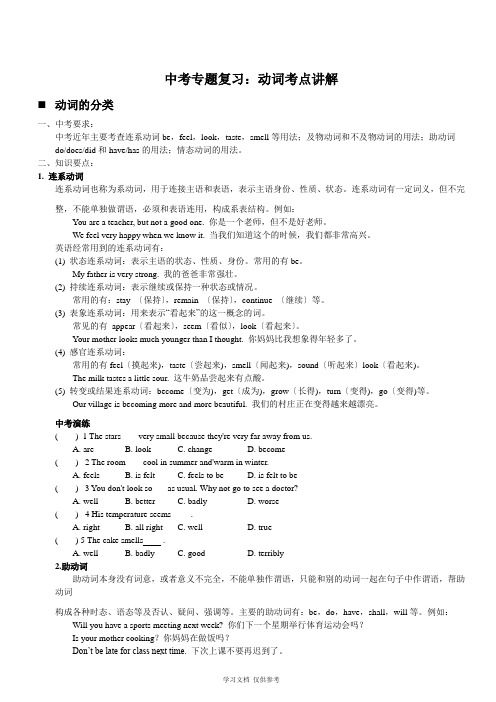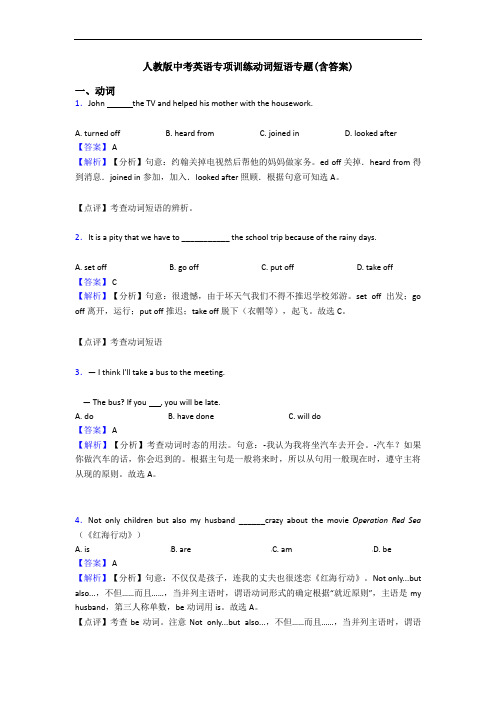中考英语英语专题复习之动词
中考英语总复习专题九动词及动词短语课件

⑥in短语 arrive in 到达
call in 拜访
believe in 信任;信赖 hand in 交上;提交;呈 送 join in 参加(=take part
或沮丧
write down 写下;记 下
in)
⑦off短语
keep off 避开;让开 clean…off 把……擦掉
⑧about短语 think about 考虑 care about 关心;在意 talk about 谈论;讨论;议论 worry about 担心;烦恼
take in 吸入;吞入(体内)
飞
take off 脱下(衣服等);起
take up 从事(工作、兴趣爱好等);着手处理
⑥turn短语 turn on 打开 turn off 关掉 turn out 结果是
turn up 调高(声音)
turn over 翻身;翻转 turn down 调低(声音) turn around 转身;调头
调查
⑬of短语 hear of 听说 think of 思考;考虑
⑭over短语
fall over 绊倒
⑮to短语 belong to 属于
listen to 听……
stick to 坚持;固守 talk to 跟……说 add…to 把……加到……上 lead to 导致;通向
lend…to… 借……给……
put down 记下;镇压
put into 把……放进;使进入 put on 穿上(戴上);上演;增加(体重) put up 张贴(广告等);搭建;举起
②look短语 look at 看 look for 寻找
look after 照顾
look through 浏览 look up 查找;查询 look around 向四周看
中考英语专题复习:动词考点讲解

中考专题复习:动词考点讲解动词的分类一、中考要求:中考近年主要考查连系动词be,feel,look,taste,smell等用法;及物动词和不及物动词的用法;助动词do/does/did和have/has的用法;情态动词的用法。
二、知识要点:1. 连系动词连系动词也称为系动词,用于连接主语和表语,表示主语身份、性质、状态。
连系动词有一定词义,但不完整,不能单独做谓语,必须和表语连用,构成系表结构。
例如:You are a teacher, but not a good one. 你是一个老师,但不是好老师。
We feel very happy when we know it. 当我们知道这个的时候,我们都非常高兴。
英语经常用到的连系动词有:(1) 状态连系动词:表示主语的状态、性质、身份。
常用的有be。
My father is very strong. 我的爸爸非常强壮。
(2) 持续连系动词:表示继续或保持一种状态或情况。
常用的有:stay 〔保持〕,remain 〔保持〕,continue 〔继续〕等。
(3) 表象连系动词:用来表示“看起来”的这一概念的词。
常见的有appear〔看起来〕,seem〔看似〕,look〔看起来〕。
Your mother looks much younger than I thought. 你妈妈比我想象得年轻多了。
(4) 感官连系动词:常用的有feel〔摸起来),taste〔尝起来),smell〔闻起来),sound〔听起来〕look〔看起来)。
The milk tastes a little sour. 这牛奶品尝起来有点酸。
(5) 转变或结果连系动词:become〔变为),get〔成为),grow〔长得),turn〔变得),go〔变得)等。
Our village is becoming more and more beautiful. 我们的村庄正在变得越来越漂亮。
中考英语专题复习--连系动词look、sound、smell、taste和feel的用法

中考英语专题复习--连系动词look、sound、smell、taste和feel的用法look, sound, smell, taste 和feel它们都属于表示知觉的连系动词。
look的意思:“看起来”、sound的意思:“听起来”、smell的意思:“闻起来”、taste的意思:“尝起来”、feel的意思“摸起来”。
使用时注意以下几点:(1) 通常以物作主语,表示人的知觉状态或感觉能力,虽有被动词味,但不用被动语态。
如:误:The stone is felt smooth.这种石头摸上去很光滑。
正:The stone feels smooth.误:The soup is tasted delicious.这汤味道不错。
正:The soup tastes delicious.(2) 其后均可接like短语。
如:That photograph doesn't look like her at all.那张照片看起来一点都不像她。
This tastes like an orange.这东西吃起来像桔子。
When I realized what stupid mistake I had made, I felt like a fool.当我发现我犯了个愚蠢的错误是,我觉得仿佛是个傻子。
(3) 除look外,均不能接to be,也均不用于进行时态(即使是look 也不多见)。
如:She looks (to be) the right person for this job.她似乎是做这项工作的合适人选。
You look / are looking very fetching in that hat with the purple dress.你戴上那顶帽子配上这紫色衣服显得非常动人。
(4) taste和smell常与of连用,意为“有┅的味道”。
如:The room smelt of cigarettes.房间里有烟味。
中考英语动词短语专题(含答案)

人教版中考英语专项训练动词短语专题(含答案)一、动词1.John the TV and helped his mother with the housework.A. turned offB. heard fromC. joined inD. looked after【答案】 A【解析】【分析】句意:约翰关掉电视然后帮他的妈妈做家务。
ed off关掉.heard from得到消息.joined in参加,加入.looked after照顾.根据句意可知选A。
【点评】考查动词短语的辨析。
2.It is a pity that we have to ___________ the school trip because of the rainy days.A. set offB. go offC. put offD. take off【答案】 C【解析】【分析】句意:很遗憾,由于坏天气我们不得不推迟学校郊游。
set off出发;go off离开,运行;put off推迟;take off脱下(衣帽等),起飞。
故选C。
【点评】考查动词短语3.— I think I'll take a bus to the meeting.— The bus? If you , you will be late.A. doB. have doneC. will do【答案】 A【解析】【分析】考查动词时态的用法。
句意:-我认为我将坐汽车去开会。
-汽车?如果你做汽车的话,你会迟到的。
根据主句是一般将来时,所以从句用一般现在时,遵守主将从现的原则。
故选A。
4.Not only children but also my husband ______crazy about the movie Operation Red Sea (《红海行动》)A. isB. areC. amD. be【答案】 A【解析】【分析】句意:不仅仅是孩子,连我的丈夫也很迷恋《红海行动》。
2024年中考英语专题复习精练—动词词组(2)

2024年中考英语专题复习精练—动词词组(2)中考真题:1.(2023·江苏扬州·统考中考真题)Paper cut-outs of “double happiness” are often ________ in the married couple’s home to bring good wishes.A.put back B.put up C.put on D.put off【答案】B【详解】句意:“双喜字”的剪纸经常被贴在新婚夫妇的家里,以表达美好的祝愿。
考查动词短语。
put back放回去;put up张贴;put on穿上;put off推迟。
“Paper cut-outs of ‘double happiness’ ”是一种剪纸,人们会把它贴在家里。
故选B。
2.(2023·天津·统考中考真题)Lisa is a popular monitor. She ________ her classmates and teachers. A.takes part in B.gets on well withC.gets into trouble with D.keeps clear of【答案】B【详解】句意:丽莎是一位受欢迎的班长。
她与同学和老师相处得很好。
考查动词短语。
takes part in参加;gets on well with相处得很好;gets into trouble with惹上麻烦;keeps clear of避开,不接触。
根据“Lisa is a popular monitor.”可知是和同学老师相处得很好。
故选B。
3.(2023·安徽·统考中考真题)Our team ________ what to do about the project and successfully completed it on time.A.gave up B.worked out C.turned down D.took away【答案】B【详解】句意:我们的团队制定出了这个项目的方案,并成功地按时完成了。
中考英语常考动词的用法

1. let sb do 让某人干某事= make sb do2. feel sb do 感觉某人做某事3.had better do 最好干……had better not do最好不干……4.Why don’t you +V原=Why not+V原为什么不干……5. will +V原didn’t+V原don’t+V原doesn’t+V原6. must 必须should 应该情态V can 能 ++V原could 能may 可以might 也许情态东西否定形式,也+V原如:can't________(sleep) mustn’t _________(go)7.W ould you please do…?你可以做某事吗?Would you please not do…?你可以不做某事吗?8. Shall we do…?我们要做某事吗?第一 first第二 second第三 third第四 fourth第五 fifth第八 eighth第12 twelfth“也”too 肯定,句末also 肯定,句中either 否定,句末Don’t swim,_________. 1. allow sb to do 允许某人干某事should be allowed to do应该被允许干某事should not be allowed to do应该不被允许干某事2. ask sb to do 让某人干某事ask sb not to do 让某人不要干某事3. tell sb to do… 告诉某人干某事tell sb not to do 告诉某人不要干某事4. invite sb to do 邀请某人干某事some advice(不加s,不可数N)一些建议6. want to do 想要干某事7. would like to do 想要干某事8. .need to do 需要干某事10.seem to do 似乎干某事11.decide to do 决定干某事12.have to do 不得不做某事13.refuse to do 拒绝做某事14.offer to do 主动干……volunteer to do 志愿做某事15.plan to do 计划干某事16.be able to do 能够干某事be unable to do 不能干….17.in order to 为了……expect to do 期望干某事wish to do 希望做某事19.what to do 干什么how to do 怎样做when to do 什么时间做去哪里……的道路make sb’s way to 前往……22.feel free to do 随便干某事23.encourage sb to do鼓励某人干某事24. a good place to do 一个干……的好地方a good way to do.. 一个干..的好方式a good time to do一个干..的好时候25. It 开头的 2个重点句型It takes +人+时间+to do句型花费某人多长时间干某事It’s+adj.+(for sb.)to do做某事对某人+形容词(做这件事对你好)It’s+adj.+of sb.to do某人做某事+形容词(你做这事真好)make it +adj+ to do.. 使干…怎么样如:make it possible to do..使干….成为可能It’s time to do…到了该做……的时候了It’s sb’s duty to do做某事是某人的责任26.Don’t forget to do 别忘记干…29.30.agree to do 同意干.……disagree to do 不同意干……努力干….try doing 尝试干……害怕干…33.warn sb to do警告某人干某事warn sb not to do34. dare to do 敢做……35. fail to do 没有成功做某事36. be+adj.+enough to do足够+形容词做某事37. sb.is ready to do某人准备好做某事38. prefer to do A ratherthan B 宁愿做A而不愿做B对比:prefer doing A to doing B比起做B,更喜欢做A39.have nothing to do with与某事无关40. the first thing to do第一件要做的事……the+序数词+N+ to do第…个干……的……41. add to do 补充做某事42.urge sb to do催促某人做某事cate sb to do教育某人做某事44.order sb to do命令某人做某事45. happen to do 碰巧做某事46.lead sb to do领导某人做某事47. have an opportunity todo 有机会做某事48. be sure to do一定会做某事1. be always doing 总是干某事2. be busy doing 忙于干某事 对比 :be busy with sth 忙于某事 3. enjoy doing 喜欢干某事 4. like doing 喜欢干某事 love doing 喜爱干某事 5. feel like doing 想要做…… 6. 对比 would like to do 7. keep doing 一直干某事 (kept 过-kept )keep sb doing 使某人一直做某事8. keep on doing 坚持干某事waste time doing 浪费时间干某事 9.stop/keep/prevent …from doing 阻止某人做某事9. finish doing 完成干某事 10. mind doing 介意干某事don ’t mind+doing 不介意干… can’t stand doing 不能忍受干… can't help doing 情不自禁干……11.… 12.(spend--spent 过-spent )花……干某事.对比:spend …on +N in 可以省略,on 不可以省略 13. have problems (in )+doing ==have difficulties (in )+doing干……有问题havetrouble doing 做某事有困难 12.succeed in doing 成功干某事of ;up 往下;沿着 before 反对;靠着如:be interested in doing 对……感兴趣be good at doing 擅长于干…How about doing ==What about doing干……怎么样?thanks for doing 因…而感谢 Thanks for helping me.谢谢你帮我.=Thanks for your help me.14. to 竟然为介词时,4个不正常的词组如下:期望干某事pay attention to doing 注意干… stick to doing 坚持干某事习惯于干某事used to do 过去常常干某事 15. be willing to do 乐意干某事 16.take up doing 从事干某事 end up doing 以做某事结束 give up doing 放弃做某事 17. avoid doing 避免干某事 18.consider doing 考虑干某事19.be afraid of doing 害怕做某事20. do some cooking/cleaning/ reading/shopping/washing做点饭/打扫一下卫生/读点书/逛逛街/洗洗衣服21. go swimming/fishing/ shopping/skating/boating去游泳/钓鱼/ 逛街/滑冰/划船 22. have fun doing 很开心做某事23. waste time/money doing浪费时间或金钱做某事24. instead of doing 代替做某事对比: instead+句子 25. miss doing 错过做某事 26. hold on to doing 坚持做某事27. suggest doing 建议做某事 28. put off doing 推迟做某事 29. succeed in doing 成功做某事30. prefer doing A to doing BB ,更喜欢做Aprefer to do A ratherthan B 宁愿做A 而不愿做B1.be+adj; stay+adj; keep+adj; feel+adj 。
中考中考英语总复习 动词基本形式(较难)

中考中考英语总复习动词基本形式(较难)一、动词基本形式1.Mr Wu keeps __________ his students that the future belongs to the well-educated. A. telling B. to tell C. ordering D. to order【答案】 A【解析】【分析】句意:吴老师一直告诉他的学生,未来属于受过良好教育的人。
tell告诉;order命令,老师是给学生们讲道理,可知此处用tell;keep doing sth持续做某事。
固定短语,故选A。
【点评】此题考查固定短语。
keep doing sth.固定短语。
2.— What do you Mo Yan's novels?— I like them very much.A. look atB. likeC. think overD. think of【答案】 D【解析】【分析】根据答语I like them very much.我非常喜欢他们。
可知问句句意为:你认为莫言的小说怎么样?你认为.......怎么样?1.What do you thinkof/about ...? 2.How do you like ...?根据What 可知此题选D。
【点评】此题考查固定的搭配,平时应多归纳总结并记忆。
3.As parents, you should pay more attention to your words, because sometimes they will ________ your child`s schoolwork.A. influenceB. improveC. increaseD. require【答案】 A【解析】【分析】句意:作为父母,你应该更多得注意你的话,因为有时候它们会影响你的孩子的功课。
A. 影响,B. 提高,C. 增长,D. 需要,根据句意可知答案,故选A。
2023年中考英语语法---动词及动词短语专题复习及练习题(含答案)

2023年中考英语语法---动词及动词短语专题复习及练习题(含答案)一、动词的基本框架动词包括实义动词、系动词、助动词和情态动词。
(一)实义动词实义动词是能独立作谓语的动词。
按其句法功能可分为及物动词和不及物动词;按其持续性可分为延续性动词和非延续性动词。
1.及物动词:及物动词本身意义不完整,需要接宾语才能使其意思完整。
(1)动词+宾语I like this book very much.我非常喜欢这本书。
(2)动词+宾语+宾补We call the bird Polly.我们叫这只鸟Polly。
I saw the children play in the park yesterday.昨天我看见孩子们在公园玩。
注意:用省略to的不定式或现在分词作宾补的动词有:have,see,watch,notice,hear等。
(3)动词+间接宾语+直接宾语Please pass me the salt.请把盐递给我。
常见的带双宾语的动词有:give,bring,buy,get,leave,lend,make,offer,pass,teach,tell等。
2.不及物动词不及物动词自身意思完整,不用接宾语。
Horses run fast.马跑得快。
(1)有些动词既可作及物动词又可作不及物动词。
We study English.我们学习英语。
(及物动词)We study hard.我们努力学习。
(不及物动词)(2)有些不及物动词与一些别的词搭配在一起构成动词短语,它的作用相当于一个及物动词。
①动词+介词Listen to the teacher carefully.仔细听老师讲。
此类动词短语后面的宾语无论是名词还是代词,都只能放在介词后面,不能放在动词和介词之间。
②动词+副词+介词Let’s go on with our work!让我们继续我们的工作吧!He gets along well with his classmates.他与他的同学们相处得很好。
- 1、下载文档前请自行甄别文档内容的完整性,平台不提供额外的编辑、内容补充、找答案等附加服务。
- 2、"仅部分预览"的文档,不可在线预览部分如存在完整性等问题,可反馈申请退款(可完整预览的文档不适用该条件!)。
- 3、如文档侵犯您的权益,请联系客服反馈,我们会尽快为您处理(人工客服工作时间:9:00-18:30)。
Wash your hands before meals.饭前要洗手。Does this cloth wash well?这布经得起洗吗?
2.系动词,亦称连系动词(Linking Verb),是用来帮助说明主语的动词。它本身有词义,但不能单独用作谓语,其后必须跟形容词、名词等作表语,构成系表结构,说明主语的状况、性质、特征等情况。
You must learn English well.(主动语态)English must be learned well ( by you).(被动语态)
4.非谓语动词
动词的基本用法是作谓语。当句中已经有了谓语动词了,要选或要填的动词就只能用非谓语形式了。
非谓语形式有三种:
1、动词不定式:
to do
动词的语态被动语态非谓语动词的形式:
动词不定式、动名词、分词主谓一致性原则:
意义一致、语法一致、就近原则系动词
三、动词可分为四类:
行为动词(实义动词)、连系动词、情态动词和助动词
1.行为(实义)动词:
实义动词意义完整,能够独立作谓语。根据其在句中是否需要宾语,又可细分为:
及物动词和不及物动词。
(1)及物动词(vt.):
两种不同的情况:
a)兼作及物动词和不及物动词时,意义不变。试比较:
Shall I begin at once?我可以立刻开始吗?(begin作不及物动词)
She began working as a librarian after she left school.她毕业后当图书馆管理员。(began作及物动词)When did they leave Chicago?他们是什么时候离开芝加哥的?(leave作及物动词)They left last week.他们是上周离开的。(left作不及物动词)
A. is cleaned
B. clean
C. cleans
D. cleaned
()
4. ___ the project as planned,we’ll have to work two more hours a day.
A. Completing
B. Complete
C. Completed
()
C. take
D. had
()
15. Hurry up! The play ____for twenty minutes.
A. has begun
B. had begun
C. has been on
D. began
二.填空(用括号内所给动词的适当形式填空。)
1.He walked up and down, ____(lose) in thought.
5. --- Do you take exercise every day?--- Yes, I always___ thirty minutes after supper.
A. pay
B. cost
C. take
D. spend
()
6. --- What do you think of the 4G mobile phone?
4.____(give) more time, the slow learners would have done better.
5.The police had everybody ____(write) down his name and address.
6.The police office had every detail ____(write) down.
c. need可作情态动词,也可作行为动词。作情态动词时,通常用在否定句和疑问句中。
(4)助动词有:
be, do/does/did , have/has/had(完成时态中), shall, will等,本身没有词义,它们和其他行为动词一起构成各种时态、语态和语气,以及帮助完成疑问句和否定句。
2.动词的时态(写出他们的构成)
九年级英语专题四
动词
一、复习目标
1.动词的分类;
2.动词的时态和语态;
3.非谓语动词。
二、复习要点
助动词
动词的分类情态动词
及物动词
实义动词行为动词
不及物动词
原形第三人称单数的一般现在时的三种形式动词的基本形式
现在分词
过去式
过去分词一般现在时、现在进行时、现在完成时、
动词的八种基
一般过去时过去进行时、过去完成时、一般将来时、本时态过去将来时主动语态
8. Look! Who ______(help) the old lady carry the bag?
9. Her broth year.
10. It ______ (rain) hard when I _____ (leave) home yesterday.
A. had played
B. have played
C. played
D. was playing
()
11. ---Do you know when Dr. White ____for dinner this evening?
---No, but I think he ____when he is free.
B. hoping
C. to hope
D. hope
()
8. John, you needn’t do your work today, you _____ do it tomorrow if you’re tired today.
A. must
B. may
C. can’t
D. need
()
9. Dick isn’t here. He ____the park.
注意:
a. can用于一般现在时;could用于一般过去时。(能)could用在一般现在时态时,只表示语气。Could you please take out the trash?
b. must表示说话人主观认为“必须”;have to表示客观需要“不得不”。must的否定形式有needn’t(不必), mustn’t(不可以,不准),must表示猜测时意为“一定”,否定用can’t(一定不,不可能)。
表示被动和完成。eg:
Given more time, we could do it better.
一、单项选择。
()
1. ---I can’t stop smoking , doctor.---For your health, I’m afraid you ____.
A. may
B. need
C. have to
2. ___ (attract) by the beauty of nature, the girl from London decided to spend two days on the farm.
3.Jim _________(finish) doing his homework already.
2、动词的ing :
doing
3、动词的过去分词:
done不定式:
表示目的和将要做的事;eg:
To get good grades, we must study hard.
动词的ing:
表示主动和进行;eg:
The girl came into the classroom, sing and dancing.过去分词:
D. must
()
2. ---Have you finished ____ the story book?--- Yes, I have.
A. to read
B. reading
C. reads
D. read
()
3. --- Do you often clean your classroom?---Yes, our classroom ____ twice a day.
A. has been in
B. has been to
C. have been in
D. have been to
()
14. ---What a nice watch! How long have you ____it?---About half a year.
A. bought
B. received
---Ireally like it, but I can’t ___it. It’s tooexpensive.
A. stand
B. afford
C. spend
D. refuse
()
7. He sent me an e-mail, ___ to get further information.
A. hoped
常用的连系动词有:
be(am, is, are, was were) , look, feel, sound, taste, smell, get, turn等。
eg:
He felt ill yesterday. / My dream is to be a scientist.
3.情态动词有:
can/could, may/might, should, need, must等。情态动词没有人称和时态的变化。
In England,people usually call me Jim for short.在英国,人们通常简称我Jim。
I found a small boy cry in the corner yesterday.昨天我发现一个小男孩在角落里哭。
2)不及物动词(vi.):
不及物动词:
不能直接接宾语,没有被动式的,需加上介词才能接宾语。
